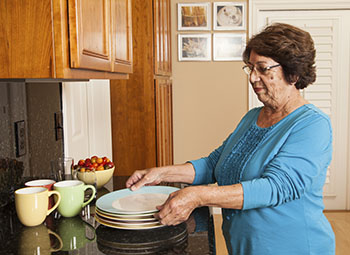During the first few weeks after surgery, you need to do things that don't use your arms too much. Using your upper body tires you faster. It can also cause pain around your incision and in your chest. It can also slow the healing of the muscle and bones at the incision site. The tips below tell you some things you can do and some you should not do for the first few weeks.
Household chores you can do
As you feel stronger, it's OK to do light household chores such as:
-
Watering small plants
-
Dusting
-
Light repairs
-
Setting the table
-
Washing dishes
-
Preparing simple meals
-
Baking
Household chores to avoid
Try not to raise your arms above your shoulders. And don't do things that make you push or pull with your upper body, such as:
-
Vacuuming, sweeping, or scrubbing
-
Changing sheets on the bed
-
Moving trash cans or heavy furniture
-
Carrying filled laundry baskets, baggage, or anything weighing more than 5 pounds
-
Gardening
-
Shoveling snow or using a snow blower
Featured in



